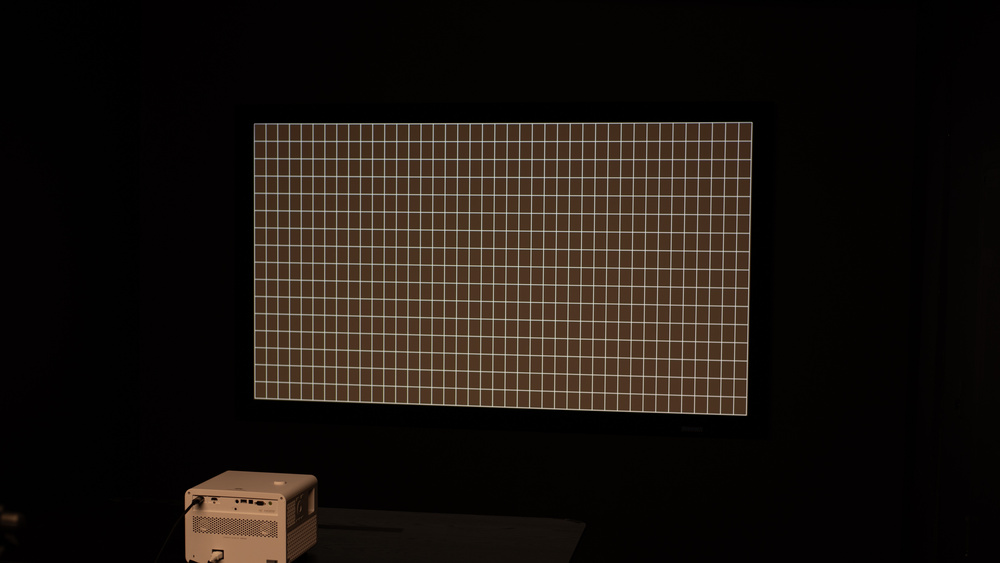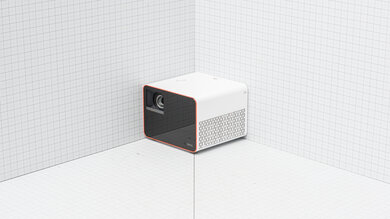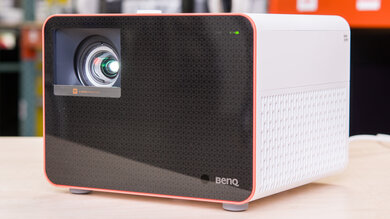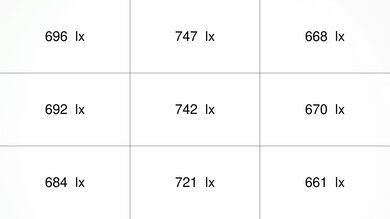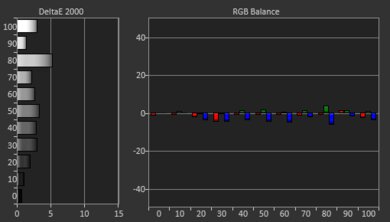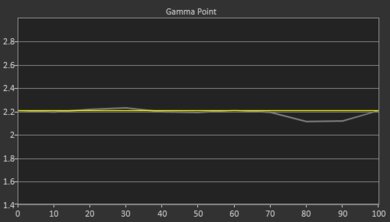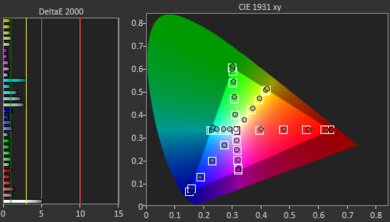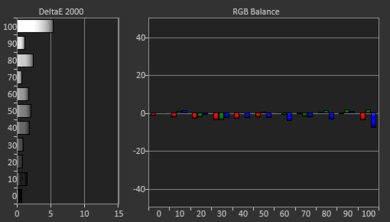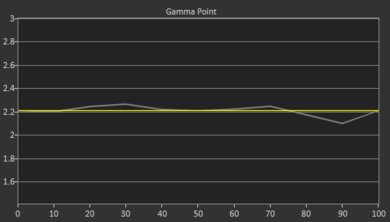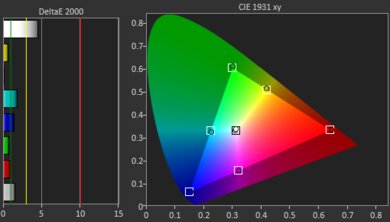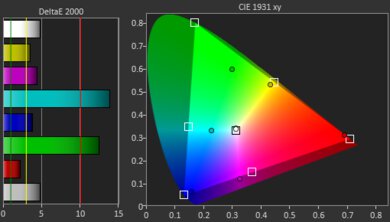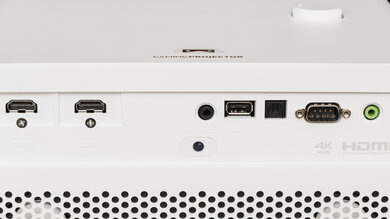The BenQ X3100i is a 4k HDR10/HLG 4LED projector primarily meant for playing video games. It replaces the BenQ X3000i and comes with the more advanced QS02 Android TV streaming dongle, while the X3000i comes with the QS01 dongle. It projects a 60" image at a distance of 5 to 6.5 feet, up to a very large 200" at a distance of 16.7 to 21.8 feet. The projector comes with auto vertical 2D Keystone technology to eliminate trapezoid effects when you install it at an angle.
It has two HDMI 2.0b ports for 4k @ 60Hz, 1440p @ 120Hz, or 1080p @ 240Hz gaming. It has one other internal HDMI 2.0b port that's reserved for the included Android TV 11 QS02 dongle. The dongle brings Wi-Fi 6 and Bluetooth 5.0 support, casting capabilities with Google Chromecast and Apple AirPlay, and support for Google Assistant and Google Voice Search. You can also use the QS02 dongle as a USB passthrough reader, so you can connect USB devices to it to use with the projector. Finally, the projector has two integrated 5W chambered speakers.
Our Verdict
The BenQ X3100i is great for watching movies. Its contrast is good, its brightness is great, and it has a wide color gamut, leading to deep blacks and a vibrant image when watched in a dark room. It's bright enough to look good in rooms with a few lights on. Its pre-calibration accuracy is excellent overall, so there's no need to have this projector calibrated to get accurate colors.
-
Good contrast for deep blacks in dark rooms.
-
Bright enough to look vibrant in dark rooms, and can even handle rooms with a few lights.
-
Wide color gamut.
-
Excellent pre-calibration accuracy.
-
The included QS02 streaming dongle has many wireless and streaming features.
- 8.1 Movies
Changelog
-
Updated May 16, 2025:
We mentioned the newly reviewed Valerion VisionMaster Pro 2 in the Color Gamut section of this review.
- Updated Jun 03, 2024: Review published.
- Updated May 29, 2024: Early access published.
- Updated May 28, 2024: Our testers have started testing this product.
- Updated May 14, 2024: The product has arrived in our lab, and our testers will start evaluating it soon.
Check Price
Differences Between Sizes And Variants
We bought and tested the BenQ X3100i, which succeeds the very similar BenQ X3000i. Overall, the X3100i is a slight but noticeable upgrade over its predecessor, as it hits higher brightness peaks, has better contrast, and has a wider color gamut. More noticeable is the inclusion of the QS02 Android TV streaming dongle, which has many more features than the QS01 dongle included with the X3000i, including Bluetooth 5.0, Wi-Fi 6, and native Netflix support.
| Model | Bluetooth | Native Netflix | Wi-Fi | Dongle USB passthrough | 1440p @ 120Hz |
|---|---|---|---|---|---|
| BenQ X3000i (QS01) | 4.2 | No | Wi-Fi 5 | No | No |
| BenQ X3100i (QS02) | 5.0 | Yes | Wi-Fi 6 | Yes | Yes |
Our unit was manufactured in September 2023; you can see the label here.
Compared To Other Projectors
The BenQ X3100i is a great projector, and like its predecessor, the BenQ X3000i, it's very versatile. The X3100i is a slight but noticeable upgrade over its predecessor, especially due to the included QS02 dongle, which has more features than the QS01 dongle included with the X3000i. Otherwise, the X3100i is a fully featured projector with an integrated smart OS, is cast capable, and even has advanced gaming features, like 1080p @ 240Hz and 1440p @ 120Hz support. Still, if you're looking for a gaming projector and don't care about having the best image quality, the ViewSonic PX701-4K is significantly cheaper. Inversely, if you're only interested in a pure home theater setup and don't care about streaming or gaming features, then the Epson Home Cinema 3800 is a better value. Still, if you're looking for a projector that can do it all, the BenQ is one of the best options on the market.
Check out our recommendations for the best 4k projectors and the best projectors for home theater. If you'd prefer to shop for a cheaper product, look up the best projectors under $1,000 instead.
The BenQ X3100i is a slight but noticeable upgrade over the BenQ X3000i. The X3100i is slightly brighter, has better contrast, and has a wider color gamut. The X3000i is somewhat more accurate out of the box, but the X3100i is still excellent. The biggest difference between the two is in the inclusion of the QS02 streaming dongle with the X3100i, which has significantly more features than the QS01 dongle included with the X3000i. Thus, if you care about streaming features, the X3100i is better, although you can buy an upgrade pack to install the QS02 dongle on the BenQ X3000i.
The BenQ X3100i is a higher-end model than the BenQ X500i and is better overall. The X500i does have some minute advantages, such as slightly better contrast and pre-calibration accuracy, but they can't overcome the X3100i's edge in brightness and colors. The X500i is a short-throw projector, however, making it easier to place closer to your screen than the X3100i. They both come with the advanced QS02 streaming dongle, giving them identical streaming and wireless features. If you're planning on using the projector solely in a dim or dark room, then you might not need the extra brightness of the X3100i, but for anyone hoping to use their projector in a brighter room, the X3100i could be worth the extra money.
The BenQ X3100i is better than the XGIMI HORIZON Ultra. The BenQ has a significantly deeper contrast ratio, so it looks better in a dark room. The BenQ is also more accurate out of the box and can be calibrated for even better accuracy, while the XGIMI can't be improved. The BenQ is also more colorful, so overall, it projects a more vibrant image than the XGIMI. Finally, the BenQ is better for gamers with its 1080p @ 240Hz and 1440p @ 120Hz support. However, the XGIMI is smaller and lighter than the BenQ and has a full suite of image correction features, making it much easier to move around than the BenQ.
The BenQ X3100i might be a bit better than the Valerion VisionMaster Pro 2 if you really don't want to calibrate your projector, as it's much more accurate right out-of-the-box, but for most people the Valerion is the better product. It's much more colorful than the BenQ, which is especially apparent in HDR content. The Valerion also supports Dolby Vision and HDR10+, while the BenQ is limited to HDR10. They're both pretty evenly matched for gamers, although the BenQ supports 1440p at 120Hz, while the Valerion only supports 1080p at that refresh rate; both projectors otherwise supports 1080p at 240Hz and 4k at 60Hz.
The BenQ X3100i is much better than the ViewSonic PX701-4K. They're both primarily marketed for gaming and thus have many gaming features. Still, while they both support 4k @ 60Hz and 1080p @ 240Hz, only the BenQ supports 1440p @ 120Hz. Furthermore, the BenQ is a fully featured smart projector with an integrated smart OS, Wi-Fi, and Bluetooth support, all of which the ViewSonic lacks. Finally, the BenQ has significantly better image quality, with better contrast and brightness, is more accurate, and has a wider color gamut.
The BenQ X3100i is better than the BenQ TK700STi. They're both gaming projectors, but the X3100i supports 4k @ 60Hz, 1440p @ 120Hz, and 1080p @ 240Hz, while the TK700STi is limited to 4k @ 60Hz and 1080p @ 240Hz. The TK700STi also comes with the older QS01 streaming dongle, which lacks many of the advanced features of the QS02 dongle included with the X3100i, although you can purchase the dongle on its own to install in the TK700STi. Otherwise, the BenQ X3100i offers superior image quality, with better brightness, contrast, accuracy, and colors.
The BenQ X3100i is vastly better than the Samsung The Freestyle 2nd Gen, but they're very different projectors. The Samsung is a small, light, and portable projector that's easy to carry around. The BenQ is a bigger projector and isn't meant to be moved. Still, it offers vastly better image quality than the Samsung model and has advanced options for gamers.
The BenQ X3100i is better than the AWOL Vision LTV-3000 Pro, although the BenQ is a long-throw projector while the AWOL Vision is an ultra-short-throw unit. Nevertheless, the BenQ is a bit brighter, has better contrast, and is far more accurate right out-of-the-box. The BenQ is also far more versatile for gamers, as it's capable of gaming at 4k @ 60Hz, 1440p @ 120Hz, and 1080p @ 240Hz, while the AWOL Vision is limited to 4k @ 60Hz or 1080p @ 120Hz.
Test Results
The BenQ X3100i is a mid-size projector without an integrated battery, so you must plug it in. The projector has auto keystone correction, but only on the vertical axis, so you must center it horizontally. It also doesn't have autofocus, so you must manually adjust that to get the clearest image possible. Its feet are slightly adjustable, and it comes with a set of extra extender feet to increase the vertical angle of the projector. Finally, the projector has two 5W integrated speakers.
The BenQ X3100i uses an LED bulb as its light source, so you likely won't ever have to worry about replacing it; the manufacturer claims the bulb lasts anywhere from 20,000 to 30,000 hours, depending on the selected eco mode. It's not a true 4k projector, as it uses pixel shifting to create a higher-resolution image. This offers better quality than a pure 1080p projector but isn't as good as a native 4k projector. It has a 1.3x optical zoom, allowing you to adjust the projection distance without moving the projector.
This BenQ X3100i's peak brightness is great and is slightly brighter than the BenQ X3000i's. Its brightness uniformity is excellent, and the projector is otherwise bright enough to look very good in a moderately-lit room. It's also bright enough to make some colors pop, especially when the lights are dimmed.
This projector has good native contrast and is slightly better than the BenQ X3000i in all scenes except the brightest ones. Overall, it has deep blacks when viewed in a dark room.
The BenQ X3100i has excellent pre-calibration image accuracy, although it's slightly less accurate than the BenQ X3000i. Blues are slightly underrepresented in most shades of white. Colors are incredibly accurate, with only whites and cyans showing minor accuracy errors. As for gamma, the projector is a bit too bright in brighter scenes, but otherwise, it's right on target. Its color temperature is also almost exactly on the 6,500K target, with just a hint of red showing through.
The projector has a full-color calibration mode and a 2-point white balance calibration. After calibration, the color accuracy is fantastic, although its white accuracy, while now excellent, still shows some minor accuracy errors in the brightest whites. This can also be seen in the projector's color accuracy, as it's now superbly accurate except in its whites. Bright scenes are still overbrightened, but darker scenes are slightly too dark. Overall, the projector is now closer to the target for moderately lit rooms. The color temperature, however, is now right on target.
The projector has a great color gamut, although not in the suggested Cinema picture mode, as Cinema clamps the color gamut to the Rec. 709 color space. However, when set to the 'FPS' picture mode, the projector achieves a wide color gamut. The projector covers almost all of the Rec. 709 color space used with SDR content and does a decent job with the wider Rec. 2020 color space, leading to a pleasantly colorful presentation in both SDR and HDR. If you're looking for a more colorful projector, especially in HDR content, consider the Valerion VisionMaster Pro 2 instead.
This projector runs the Android TV 11 smart interface on its included QS02 dongle and is fully cast capable through Google Chromecast and Apple AirPlay. The dongle also supports Google Voice search and Google Assistant. Unlike the QS01 dongle included with the BenQ X3000i, the QS02 dongle natively supports Netflix. The projector also has two 5W integrated speakers.
The projector has a 12v trigger out port to connect your screen to it; this allows you to signal the screen to unfold when the unit powers on and inversely retract the screen when it's powered off. The projector has one extra HDMI port behind the top cover reserved for use with the bundled QS02 Android TV Dongle. The dongle supports Chromecast and AirPlay, as well as Bluetooth 5.0. The dongle also has Wi-Fi 6 support. The USB port on the projector itself is a service port that you can use for power delivery, but you can use the dongle as a USB reader; you can connect USB devices to the dongle, and the projector will recognize them.
Comments
BenQ X3100i: Main Discussion
Let us know why you want us to review the product here, or encourage others to vote for this product.
Update: We mentioned the newly reviewed Valerion VisionMaster Pro 2 in the Color Gamut section of this review.
- 21010
Would you be able to share your calibration steps / guide for the BenQ X3100i? Apologies if it’s been posted somewhere and I am missing it.
Hi! Unfortunately, we’re not currently sharing our calibration settings for projectors. We may in the future, but it’s not planned right now. In any case, our settings are unlikely to help because the room itself has such a huge impact on calibration—even the clothes you wear can affect how the projector looks.
- 21010
The review states that this projector has hdr10+ playback. I haven’t seen any other reviews or specs say this. Are we certain it has this feature?
Hi! You’re right, the unit itself doesn’t support HDR10+, only HDR10. The streaming dongle it comes with, however, does support HDR10+, but the projector can’t take advantage of that feature. We’ll change the intro to remove mention of the projector itself being HDR10+ compatible. Thanks!
- 21010
The review states that this projector has hdr10+ playback. I haven’t seen any other reviews or specs say this. Are we certain it has this feature?
- 21010
Would you be able to share your calibration steps / guide for the BenQ X3100i? Apologies if it’s been posted somewhere and I am missing it.
how is it compared to x500i?
Hello! Help with personalized buying advice is something our experts offer only via our insider forums. We do have lots of self-service tools and recommendation articles that should be helpful as well though!
- 21010
how is it compared to x500i?
- 21010

